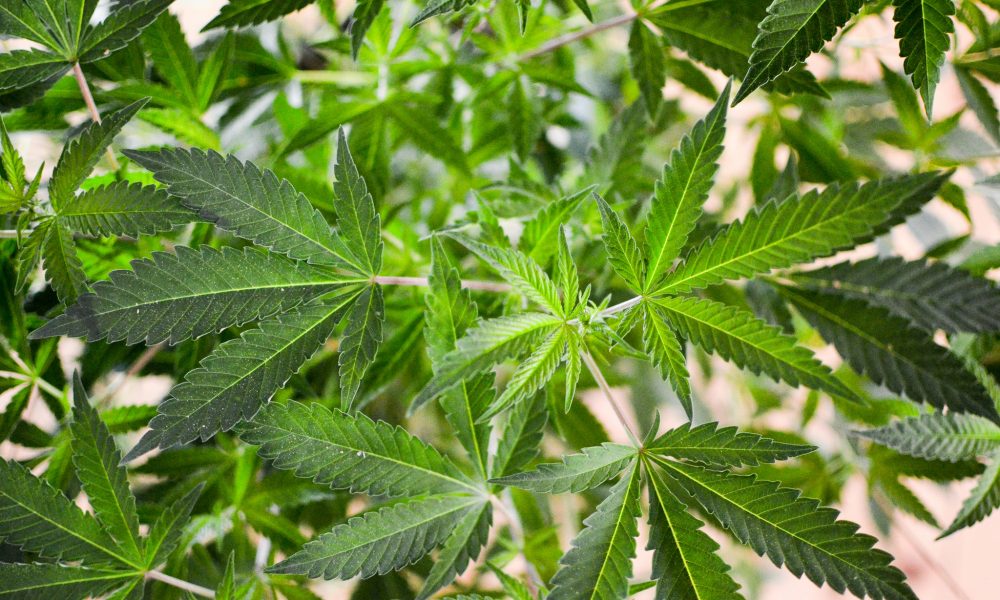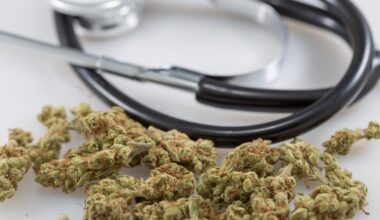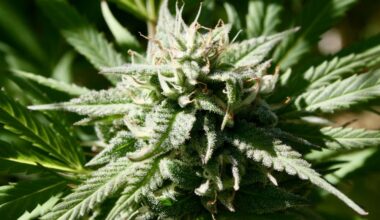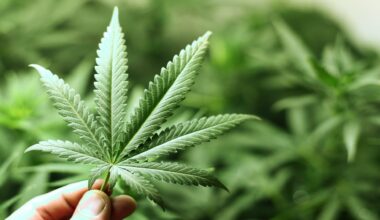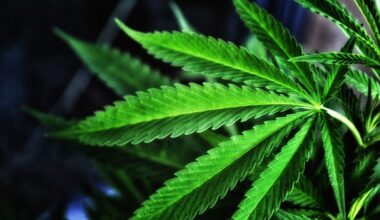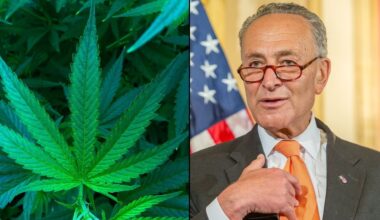Congressional lawmakers have again included protections for states with medical marijuana programs—as well as several other cannabis-related provisions—in new spending legislation for Fiscal Year 2022.
But while advocates are encouraged by the inclusion of the marijuana riders, which also includes language to prevent the penalization of universities that conduct cannabis research, they’re holding out hope that a broader provision is added later in the process to keep the Department of Justice from using its funds to interfere in the implementation of any state-level legalization law—including those that allow recreational use.
There are two key House Appropriations bills that include language on marijuana issues that were approved in subcommittee on Monday, and the full panel is set to take those measures up on Thursday.
The most consequential measure, which has been added to spending legislation and enacted in federal law going back to 2014, would prevent the Justice Department from using tax dollars to intervene in the implementation of medical cannabis programs in states:
“SEC. 531. None of the funds made available under this Act to the Department of Justice may be used, with respect to any of the States of Alabama, Alaska, Arizona, Arkansas, California, Colorado, Connecticut, Delaware, Florida, Georgia, Hawaii, Illinois, Indiana, Iowa, Kentucky, Louisiana, Maine, Maryland, Massachusetts, Michigan, Minnesota, Mississippi, Missouri, Montana, Nevada, New Hampshire, New Jersey, New Mexico, New York, North Carolina, North Dakota, Ohio, Oklahoma, Oregon, Pennsylvania, Rhode Island, South Carolina, South Dakota, Tennessee, Texas, Utah, Vermont, Virginia, Washington, West Virginia, Wisconsin, and Wyoming, or with respect to the District of Columbia, the Commonwealth of the Northern Mariana Islands, the United States Virgin Islands, Guam, or Puerto Rico, to prevent any of them from implementing their own laws that authorize the use, distribution, possession, or cultivation of medical marijuana.”
It remains to be seen whether lawmakers will push for an additional amendment in the full committee or on the floor to protect adult-use marijuana programs as well, as the House approved in 2019 and 2020. The provision was not attached to final bills sent to then-President Donald Trump’s desk, however, after they were not included in Senate versions that advanced when the chamber under Republican control.
Another longstanding provision again included in the latest Commerce, Justice, Science, and Related Agencies (CJS) spending legislation would bar DOJ or its component Drug Enforcement Administration (DEA) from interfering in state-legal hemp programs. Here’s the text:
“SEC. 530. None of the funds made available by this Act may be used in contravention of section 7606 (“Legitimacy of Industrial Hemp Research”) of the Agricultural Act of 2014 (Public Law 113–79) by the Department of Justice or the Drug Enforcement Administration.”
A new provision was also attached to the bill that would make states and localities ineligible for certain federal law enforcement grants if they maintain a policy allowing for no-knock warrants for drug-related cases. That policy garnered national attention following the police killing of Breonna Taylor, who was fatally shot by law enforcement during a botched drug raid.
“SEC. 219. None of the funds made available by this Act under paragraph (1) under the heading “State and Local Justice Assistance”, or under the heading “Community Oriented Policing Services”, may be awarded to a State or unit of local government unless the Attorney General of the United States certifies that the State or unit of local government—
…
(6) has in effect a law that prohibits the issuance of a “no-knock warrant” in a drug case, consistent with the requirements as described in section 362 of H.R. 1280 of the 117th Congress as passed by the House of Representatives on March 3, 2021.”
Over in the House Labor, Health and Human Services, Education, and Related Agencies Appropriations Subcommittee, members put language in their spending bill that prohibits the Department of Education from denying funds to colleges that carry out—or plan to carry out—research into cannabis. Here’s the text:
“SEC. 316. None of the funds appropriated by this title for the Department of Education shall be withheld from an institution of higher education solely because that institution is conducting or preparing to conduct research on marihuana as defined in 21 U.S.C. 802(16).”
But advocates are disappointed to see that another rider dating back to the 1990s was included again that broadly prevents agencies from promoting the legalization of Schedule I substances like marijuana. Rep. Alexandria Ocasio-Cortez (D-NY) attempted to get that language deleted in 2019 by arguing that it impedes research on psychedelics, but Democrats joined Republicans in rejecting her floor amendment. The proposed text for 2022 states:
“SEC. 507. (a) None of the funds made available in this Act may be used for any activity that promotes the legalization of any drug or other substance included in schedule I of the schedules of controlled substances established under section 202 of the Controlled Substances Act except for normal and recognized executive-congressional communications.
(b) The limitation in subsection (a) shall not apply when there is significant medical evidence of a therapeutic advantage to the use of such drug or other substance or that federally sponsored clinical trials are being conducted to determine therapeutic advantage.”
In a press release, the committee also touted the fact that the bill “removes a longstanding general provision that prohibited federal funds from being used to purchase syringes as part of a public health campaign to provide services to individuals involved in injection drug use.”
—
Marijuana Moment is already tracking more than 1,100 cannabis, psychedelics and drug policy bills in state legislatures and Congress this year. Patreon supporters pledging at least $25/month get access to our interactive maps, charts and hearing calendar so they don’t miss any developments.![]()
Learn more about our marijuana bill tracker and become a supporter on Patreon to get access.
—
That’s a significant development as far as harm reduction advocates are concerned. And on a related noted, the governor of Rhode Island signed a bill last week to establish a safe consumption site pilot program where people could test and use currently illicit drugs in a medically supervised environment. It’s the first state in the country to legalize the harm reduction centers.
The marijuana and drug policy provisions in the new spending bills are just the latest examples of how lawmakers are using the annual appropriations process to advance reform.
A House subcommittee and then the full Appropriations Committee approved a large-scale funding bill last month that includes provisions protecting banks from being punished for working with marijuana businesses and allowing Washington, D.C. to legalize cannabis sales.
The move by congressional Democrats to let the District of Columbia set its own marijuana policies is in contrast with a budget released last month by President Joe Biden, which proposed continuing the longstanding Republican-led rider that has prevented the city from spending its own money to regulate adult-use cannabis commerce.
The banking-related provision is less far-reaching than more robust standalone bills the House has passed on four occasions, but would still provide some protections to banks that work with state-legal marijuana operators.
Both measures are attached to the Financial Services and General Government bill for Fiscal Year 2022. The corresponding committee report also urges federal agencies to reconsider policies that result in the firing of employees who use marijuana legally in accordance with state law.
In a separate spending bill that allocates annual funding for the Department of Homeland Security (DHS), there’s also a provision that would protect immigrants from have their status penalized simply because they’ve admitted to using cannabis or were convicted of a low-level marijuana offense.
Standalone legislation has been introduced this session to resolve the problem, but it has yet to be acted on.
The Appropriations Committee also approved a bill that includes a report acknowledging that the U.S. Department of Veterans Affairs (VA) has clarified that military veterans are eligible for home loan benefits even if they work in a state-legal marijuana industry. However, it expresses disappointment that VA hasn’t taken further action to communicate this policy to lenders and borrowers.
The new report directs VA to improve that communication and report back to Congress on its progress within 180 days of the enactment of the legislation. A separate provision urges VA to expand research on the medical benefits of cannabis for veterans.
Separately, there are a host of provisions on hemp and its derivatives like CBD in another spending bill and attached report that covers funding for the U.S. Department of Agriculture (USDA) and Food and Drug Administration (FDA).
In the report, lawmakers took issue with the 2018 Farm Bill’s 0.3 percent THC cap for lawful hemp products and directed USDA to work with the U.S. Department of Health and Human Services (HHS) and DEA on a study of whether that threshold is scientifically backed.
The Appropriations Committee also approved a report last month voicing support for federal law enforcement efforts to deploy drones in California to find illicit marijuana grow sites on public lands. However, it said that support is contingent on resolving issues related to cybersecurity and domestic production.
The Biden administration, for its part, is being closely watched by advocates when it comes to any marijuana policy development—especially since the president has maintained an opposition to adult-use legalization even as multiple bills to end federal prohibition are being drafted and introduced.
Perhaps unsurprisingly, Biden’s budget did not propose gutting the Office of National Drug Control Policy (ONDCP) as Trump did. The former president called for a roughly 90 percent cut in the agency’s budget in his proposals, but Congress did not follow suit. Biden helped to establish the drug czar’s office during his time in the Senate.
Biden’s budget also includes $17 million in funding to support industrial hemp production.
Photo courtesy of Philip Steffan.
Medical Disclaimer:
The information provided in these blog posts is intended for general informational and educational purposes only. It is not a substitute for professional medical advice, diagnosis, or treatment. Always seek the advice of your physician or other qualified healthcare provider with any questions you may have regarding a medical condition. The use of any information provided in these blog posts is solely at your own risk. The authors and the website do not recommend or endorse any specific products, treatments, or procedures mentioned. Reliance on any information in these blog posts is solely at your own discretion.
